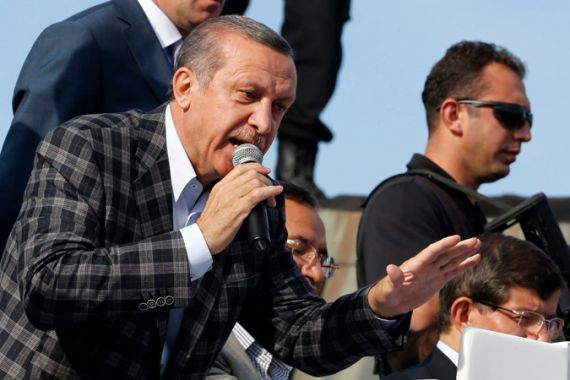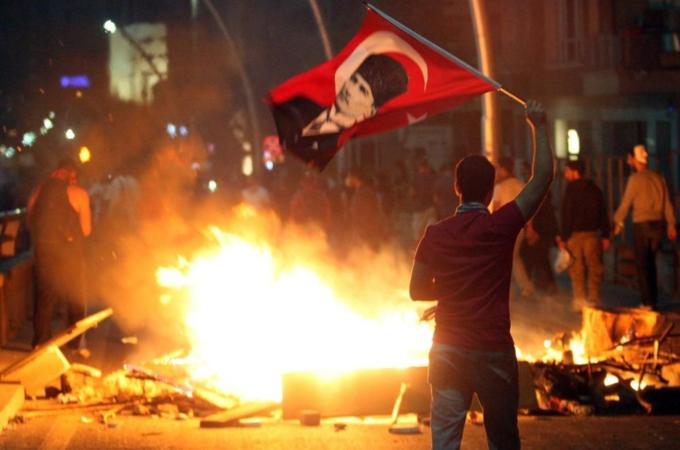Erdogan’s conservative shift draws fire
Turkey’s prime minister was once championed for implementing democratic reform, but critics accuse him of losing touch.

Istanbul, Turkey – When Prime Minister Recep Tayyip Erdogan first came into office in 2002, Mahmut Nil was one of the 34 percent of the country’s voters who elected him.
“Before Erdogan, we had a lot of very bad leaders in the past. Edrogan gave us a lot of promises about democracy, progress, development and human rights,” says Nil, a psychologist in Istanbul.
Eleven years later, Nil now accuses the prime minister of behaving like a dictator and trying to impose strict Islamic law. “Erdogan and the AKP [Justice and Development Party] proved that their platform is radical Islamic politics. I don’t want to live in Iran,” says Nil.
The nationwide anti-government protests that have overtaken Turkey and now spilled into their second week are perhaps as unexpected for the demonstrators as they have been for Erdogan.
For a number of years, Erdogan was looked upon as a reformer who had managed to restore the Turkish economy, make the country more open and tolerant, and improve Turkey’s chances of joining the European Union. Only in recent years has the Erdogan government begun to alienate swathes of the country, pursuing conservative laws and policies seemingly without regard for the views of those outside AKP.
It's not that Erdogan and his AKP cadres did not believe in such a conservative vision early, it's just that they feel that this is what they can implement because they have the public support to do so.
But Erdogan’s shift from a reformer to a conservative accused of despotism doesn’t appear to be the result of a change in his convictions. Since taking office, the prime minister has managed to broaden his base of support and win a near veto-proof hold on government. Initially elected with just a third of the vote, Erdogan claimed 50 percent of the ballots in the 2011 election. Erdogan appears to have interpreted this electoral success as a mandate and has largely done away with consensus building politics.
“It’s not that Erdogan and his AKP cadres did not believe in such a conservative vision early, it’s just that they feel that this is what they can implement because they have the public support to do so,” says Soner Cagaptay, a Beyer Family Fellow and director of the Turkish Research Program at the Washington Institute for Near East Policy. “As they built their power base, they became less likely to listen to opposing views.”
Conservative views
Erdogan’s conservative beliefs were known long before he was elected to serve as the country’s prime minister. A graduate of an imam training school, Erdogan started his political life involved with “pro-Islamic” groups. In 1994, he became the mayor of Istanbul, but was forced from office in 1998 after reciting a poem with fundamentalist overtones which Turkish authorities said incited religious hatred. In addition to losing his position as mayor, Erdogan also served several months in prison and was temporarily banned from politics.
Although Erdogan remained a conservative figure in politics when he re-entered the scene ahead of the 2002 elections, he offered voters a more centrist agenda based on making reforms that appealed almost universally throughout Turkey.
In the years that followed, his government led the country through a period of significant improvement. The per capita gross national income and the GDP have tripled over the past decade, and, by 2012, Turkey was ranked as the world’s 13thmost attractive place for foreign direct investment on AT Kearney’s 2012 FDI Confidence Index. Meanwhile, the country had pursued a number of EU reforms to enhance its membership chances, and Erdogan had made unprecedented efforts to negotiate with Kurdish armed groups.
 |
| Anti-government protesters in Ankara in early June [AFP] |
To be certain, Erdogan had also pursued a number of controversial programmes, such as censoring the internet, but by and large, amid a generally improving country, few Turks saw reason to make major complaints. It wasn’t until Erdogan swept the electoral board in 2011 that many Turks say they began to see a significant shift in Erdogan’s style of leadership.
“He appears to be almost an entirely different man after the last elections in 2011. Previously, he was a prudent leader. He took into consideration all the different sensitivities in the country,” says Sahin Alpay, a senior lecturer in Turkish and comparative politics at Bahcesehir University and a columnist for newspapers Zaman and Today’s Zaman. “It just doesn’t make sense that such a great reformer, a leader who has made the country richer and freer than ever is turning into an authoritarian figure.”
Cracking down
By the autumn of 2012, Turkey had become the world leader in journalists imprisoned for reporting critically on the government. A number of Turks say that recent restrictions on selling alcohol between 10pm and 6am – a common grievance among protesters – are emblematic of the more conservative tone taken by the Erdogan government, and they worry it may begin to remove other freedoms as well.
“Most people thought about AKP as not liberal and maybe a little conservative, but now we see what they really are,” says Nurkan Ilbahar, a student who is protesting in Taksim Square. “After this I don’t think anyone will trust AKP, or Erdogan.”
Those participating in the demonstrations now largely represent the half of the country who did not vote for Erdogan. Though discord in Turkey had been slowly building for several years, the protests erupted when police violently broke up a peaceful sit-in at Gezi Park, one of downtown Istanbul’s last green spaces. The park was reportedly slated to be demolished and replaced with a commercial development.
You will see the same situation in Europe or other Western democracies as well, where a leader who has been in power for ten years kind of loses touch with the people and misjudges the popular mood of the people.
Protests have evolved to incorporate a range of issues that largely centre around the growing conservative policies of the Erdogan government and the prime minister’s style of governance, which most protesters say only addresses the needs and wants of those who support him. Though Erdogan has offered to meet with protest leaders, he’s also made thinly veiled threats of a violent crackdown if they continue demonstrating.
Divided opposition
Erdogan has likely maintained his steadfastness even in the face of mass protests because the opposition has little holding them together beyond their disapproval of the prime minister. Rather than confronting a singular opposition, Erdogan is faced with a patchwork of political groups with competing motives and that are easily out manoeuvred. Next to the AKP, the second-largest party in Turkey is half its size. In this environment, Erdogan has no need to make compromises with his political rivals to accomplish his policy goals.
“You will see the same situation in Europe or other Western democracies as well, where a leader who has been in power for ten years kind of loses touch with the people and misjudges the popular mood of the people,” says Didem Collinsworth, Turkey analyst at the International Crisis Group. “This is a government that legitimately won 50 percent of the support, but somehow along the way started misjudging the mood and [these protests] is a wake up call – that they have to pay attention to the people who didn’t vote for them and include them in the process.”
So far, unrest and the government’s response appear to have had minimal effect on Erdogan’s base of support. Barring the possibility of an early election, Turkey will vote in local and presidential elections in 2014 and parliamentary elections in 2015. It remains likely that Erdogan will win again, however, ongoing demonstrations may force the prime minister to govern more cautiously, as he did when he first took office.
“In concrete terms, things will not change overnight, there is no doubt about it. The opposition is still fragmented and the opposition, to me, is still very confused. They have leadership problems, they have problems of ideology, they have problems of purpose, etc,” says Umit Cizre, the director of the Center for Modern Turkish Studies at Istanbul Sehir University.
“But at the same time I’m very, very, very optimistic that the Turks have passed the psychological threshold of gaining some self-confidence about being able to change the agenda of the country overnight.”
Follow Tom A Peter on Twitter: @TomAPeter